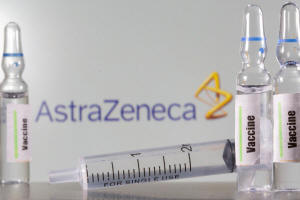AstraZeneca COVID-19 vaccine shows promise in elderly, trial results by
Christmas
 Send a link to a friend
Send a link to a friend
 [November 19, 2020]
By Kate Kelland and Alistair Smout [November 19, 2020]
By Kate Kelland and Alistair Smout
LONDON (Reuters) - AstraZeneca and Oxford
University's potential COVID-19 vaccine produced a strong immune
response in older adults, data published on Thursday showed, with
researchers expecting to release late-stage trial results by Christmas.
The data, reported in part last month but published in full in The
Lancet medical journal on Thursday, suggest that those aged over 70, who
are at higher risk of serious illness and death from COVID-19, could
build robust immunity.
"The robust antibody and T-cell responses seen in older people in our
study are encouraging," said Maheshi Ramasamy, a consultant and co-lead
investigator at the Oxford Vaccine Group.
"We hope that this means our vaccine will help to protect some of the
most vulnerable people in society, but further research will be needed
before we can be sure."

Late-stage, or Phase III, trials are ongoing to confirm the findings,
researchers said, and to test whether the vaccine protects against
infection with SARS-CoV-2 in a broad range of people, including people
with underlying health conditions.
Results of those trials should definitely be known by Christmas, the
Oxford Vaccine Group's director, Andrew Pollard, said, adding it was too
early to know whether and how well the vaccine works in preventing
COVID-19 disease.
"We're still waiting to get to the point where we can do the analysis to
just work out how well the vaccine can protect people, and we're getting
ever closer to that," he told journalists.
"We are optimistic that we'll be able to do that before Christmas, and
obviously we'll share that with you as soon as we can at that point."
The Oxford-AstraZeneca COVID-19 vaccine candidate, called AZD1222 or
ChAdOx1 nCoV-19, had been among the front-runners in global efforts to
develop shots to protect against infection with the novel coronavirus,
or SARS-CoV-2.
[to top of second column]
|

A test tube labelled with the word Vaccine is seen in front of
AstraZeneca logo in this illustration taken, September 9, 2020.
REUTERS/Dado Ruvic/Illustration/File Photo

But rival drugmakers Pfizer Inc, BioNTech and Moderna Inc have in
the past 10 days edged ahead, releasing data from late-stage
COVID-19 vaccine trials that shows more than 90% efficacy.
"We're not in a rush. We and it's not a competition with the other
developers," Oxford's Pollard said, adding that AstraZeneca would
release headline efficacy data before it was published in an
academic journal.
Oxford University has set a target of 53 infections to start the
interim analysis of its late-stage trial results, though "lots of
cases" in its trial arms in Britain, South Africa and Brazil mean
the exact number of infections reported could differ.
Unlike the Pfizer-BioNTech and Moderna shots, both of which use new
technology known as messenger RNA (mRNA), AstraZeneca's is a viral
vector vaccine made from a weakened version of a common cold virus
found in chimpanzees.
The Phase II trial reported in The Lancet involved a total of 560
healthy volunteers, with 160 aged 18-55, 160 aged 56-69, and 240
aged 70 or over.
Volunteers got two doses of the vaccine or a placebo, and no serious
side effects related to the AZD1222 vaccine were reported, the
researchers said.

AstraZeneca has signed several supply and manufacturing deals with
companies and governments around the world.
(Reporting by Kate Kelland; Additional reporting by Alistair Smout;
Editing by Matthew Lewis, Alexander Smith and Nick Macfie)
[© 2020 Thomson Reuters. All rights
reserved.] Copyright 2020 Reuters. All rights reserved. This material may not be published,
broadcast, rewritten or redistributed.
Thompson Reuters is solely responsible for this content. |